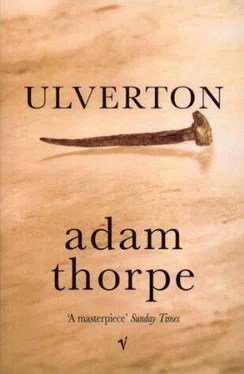Adam Thorpe - Ulverton
Здесь есть возможность читать онлайн «Adam Thorpe - Ulverton» весь текст электронной книги совершенно бесплатно (целиком полную версию без сокращений). В некоторых случаях можно слушать аудио, скачать через торрент в формате fb2 и присутствует краткое содержание. Год выпуска: 2012, ISBN: 2012, Издательство: Random House, Жанр: Современная проза, на английском языке. Описание произведения, (предисловие) а так же отзывы посетителей доступны на портале библиотеки ЛибКат.
- Название:Ulverton
- Автор:
- Издательство:Random House
- Жанр:
- Год:2012
- ISBN:9781448130061
- Рейтинг книги:4 / 5. Голосов: 1
-
Избранное:Добавить в избранное
- Отзывы:
-
Ваша оценка:
- 80
- 1
- 2
- 3
- 4
- 5
Ulverton: краткое содержание, описание и аннотация
Предлагаем к чтению аннотацию, описание, краткое содержание или предисловие (зависит от того, что написал сам автор книги «Ulverton»). Если вы не нашли необходимую информацию о книге — напишите в комментариях, мы постараемся отыскать её.
Told through diaries, sermons, letters, drunken pub conversations and film scripts this is a masterful novel that reconstructs the unrecorded history of England.
Ulverton — читать онлайн бесплатно полную книгу (весь текст) целиком
Ниже представлен текст книги, разбитый по страницам. Система сохранения места последней прочитанной страницы, позволяет с удобством читать онлайн бесплатно книгу «Ulverton», без необходимости каждый раз заново искать на чём Вы остановились. Поставьте закладку, и сможете в любой момент перейти на страницу, на которой закончили чтение.
Интервал:
Закладка:
My wife has not talked to me one word for two weeks now. I continue, however, to read her passages from the Epistles. Her bed-linen is stained with her sweat, although she has no fever to speak of. She does not appear much in distress, but now and again will walk to the window, open wide the shutters, and mutter into the yard upon her herbs. She will not be parted from her straw doll, that she lies with. This day, being my birthday, we turned a roast upon the spit, and my cousin and the servants who live with us (this being three) drank too much berry wine. My wife remained abed.
More rain, for a half hour, this July 17th, but not sufficient to meliorate the barley. I meditated in my bed upon ways of irrigation in times of drought, and conceived of a pump with several mouths, that might be carried upon a cart, if the cart be watertight and very large. This just before I slept and dreamed of a son delivered from a raven, which disturbed me greatly in the middest night.
The maid this morning ran to me crying whilst I was overseeing the loading of the rag pieces onto the waggon for carriage down to the fallow. She had a cut upon her arm, where my wife had lashed her with a waggon-thong from the shed. An old ploughman called Perry, who was up to view the rags, recalled how the witch Anne Cobbold could cure these fevers of the mind by mumbling and staring and various doings with animal bones laid in the river at night. He it was who as a boy kept the sheep watched over while the old shepherd sinned with her, when she was turned into a ewe: there being little doubt of the truth thereof, as I have heard this from the mouth of a most reliable witness, and also from one who delivered Anne Cobbold of a dead child, that was covered over with a silky fleece throughout, and had a blunt snout very like a sheep’s. Yet I remonstrated with the man to keep the Devil’s work out of it, and he kept his silence then. He is full of stories and no teeth. I sent the maid home. I fetched an old dame from the village to scour, wash et cetera and ring up the cheese clout, while my wife lay abed. I found the waggon-thong upon a hook in the still-room, in the shape of a noose. We scattered the rag pieces evenly upon the naked fallow, each seed-lip taking a goodly number when packed in, and earthed them in with the coulter. My cousin says they might warm the ground through the winter, as they once warmed poor fellows. I said I preferred not to recall from whence they derived. The two seeds-men thought the whole affair the work of madness. I said that when they saw the crop chissum despite this spongy ground they would heal their words with the tines of Reason and Progress. They said, nay, it would only give the ground pox.
My eight swine have yielded, in one year, fifty-two loads of fine manure. I am glad to have kept such close account of this, the first year I have done so. I have a book wherein I vouch to record all possible numbers of yields, loads etc., that a proper reckoning might be made of methods of Improvement, and the exact profit thereby pertainable.
In order to meliorate my wife’s illness, I have given over the sum of £5 to the building of a new Chapel upon the site of the old, in Bew’s Lane, this one to be of brick, not wood, and my name to be enscribed with the other contributors within, upon a small stone.
The field of St Foin that I hayned up from the cattle is well filled, and ready for cutting: the kernel is of a purplish hue, and the husk brown. Being thus not quite full in general, excepting at the headlands, the seed will not shed overmuch at mowing. It being extremely hot in the day, the mowers will start in the middest night, at three of the morning, and cease cutting when the sun shining causes the seed to shatter. They may then proceed again in the cool of the evening.
Our pond is quite dried out, and cracked. It is exceeding hot, and the river is full of children these days. The field is almost mown. The moon is at its fullest and by its light the mowers can see as well as in the day. They say it is still too hot, even in the night, and the owls make them fearful, because they are a superstitious breed of people here, and would rather be abed. One, by the name of Shail, claims to have witnessed a dance of fairies on his way to the field, this occurring in the ash-copse, and filling him with much wonder, but I scolded him severely for his softness. The roads at this early hour are very white indeed under the moonlight, and it is indeed surprising warm, and odorous. I insist upon the swarths being turned in the early hours, when the moistness in the ground sticks the seed to the ear, and not when the sun is hot. I demonstrated to the mowers the efficacy of this rule by shaking lightly a rakeful in the midday and shaking out well nigh all the seed. The swarths are turned by the handle of the rake, ears first, as advised to me by Farmer Barr. The seed is not ripe enough to cock straightway.
My wife has spoken to me, but names me the Duke, as in the latterly-dismissed Marlborough, I presume. I cannot fathom to what this refers, or whether in her madness it means but nonsense. Over what have I gained victory? What armies can I lead in her befuddled head? The servants giggle in corners of the yard, which distresses me greatly. The maid is very full for her time. All the St Foin is reeked and they are to be thatched forthwith. I noted that when the cocks were built up, the bulk of each shook all over when struck by the rake, that striking the top sent a shiver, as it were, all the way to the bottom, as if the mown grass had turned into a jelly. So the action on one part of a body affects the whole. The reeks are too large for this effect to be easily noticed.
The maid took me into the still-room very early, at six, and we coupled, which made me anxious for the child, but she had hold of my member and it was exceeding hard to desist, as I had not lain with her for a month or more. We coupled like beasts.
The wheel upon a waggon returning over the St Foin stubble and striking an indentation cracked and split suddenly, and threw a labourer from his seat atop the hay. His head in turn striking a flint upon the ground, was cracked wide open, and he was carried into the village by his fellow harvesters, to the inn, where he died forthwith. His name was James Pyke. He was a good man, a member of our Chapel, an excellent labourer and servant, and left a large family. I had only been talking to him, about the dryness of the reeked hay, and the possibility of thunder, an hour before. I fear the hard frosts of the winter acting upon the damp wood weakened the wheel within. It was the same waggon I found split before, having lain abroad, and took in, but too late, it seems. The other fellows returned greatly upset by this misfortune, and resumed thatching with unwilling limbs, or so it appeared. The bell rang out and we took off our hats and stood for a moment and I read a short prayer. The wainwright stated the wheel to be too far split to be mended, and I have perforce to pay for a new one, which being of a large and heavy type, will prove costly. The split occurred along two of the spokes, these being of cleft oak, but nevertheless weakened as stated before, which led to the general collapse of the felloes, and the weight of the waggon falling cracked the nave. So might a small error lead to the greater, and to fatality. The way is harsh and uneven for the true pilgrim.
A horse that is kittle may be so owing to temperament or mischance or ill-breeding or ill-treatment. However it be so, it will prove a danger for its master. So it is with wives. This day I found the straw doll hung from the beam in the cow-house by its neck. I burnt it forthwith. It was indicated to me by one of the servants, who was paid 6d for his silence. The Chapel was knocked down this day, it being only a flimsy structure of wood, and the new to be begun forthwith. Farmer Garrard was over this day, and averred, on surveying my new clover crop, that he might adopt this method of seeding, viz.: to sow the seed in the husk, that it might prove to crop more evenly and thicker, whereas to sow clover-seed on its own, pure, milled from the husk, perforce proves too light a cast in the March winds. I said, that it might be advantageous, then, to mix the seed with sand, or sifted coal, or wood-ash, to give the half-pecks weight, that it might fill the seeds-man’s hand, and not prove too buoyant. He stated, that this was good advice, if the seed were milled, as oatmeal is, but that effort might be spared in the first place by retaining the husk anyways. Farmer Garrard’s own clover field, mixed with Polish oats, that shadows it from this summer heat, is exceeding thin in places, owing to the blustery days in which the pure seed was cast, and scattered errantly. I averred that I would use this digression in my Sunday speech in the Chapel, as a parable fitting to the times. The seed being the soul, and the husk being the body, or flesh. We are cast into this life with the trappings of our flesh, that gives us weight, whereas if we deny the flesh, we are too light, and buoyant, like a cloud of bedwine seed, and know not where we go, as a man who denies himself meat grows thin, and lassitudinous. United in the flesh, our soul grows a goodly crop of virtue, the winds and rains our sufferings, that gives us exercise and greenness, and not to be shirked. Farmer Garrard, who is a Church man, said that the sermon for him mentioned flesh overmuch, although he is himself fleshy, and we laughed.
Читать дальшеИнтервал:
Закладка:
Похожие книги на «Ulverton»
Представляем Вашему вниманию похожие книги на «Ulverton» списком для выбора. Мы отобрали схожую по названию и смыслу литературу в надежде предоставить читателям больше вариантов отыскать новые, интересные, ещё непрочитанные произведения.
Обсуждение, отзывы о книге «Ulverton» и просто собственные мнения читателей. Оставьте ваши комментарии, напишите, что Вы думаете о произведении, его смысле или главных героях. Укажите что конкретно понравилось, а что нет, и почему Вы так считаете.










